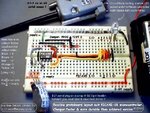Y.li
Member level 2
Hello,
I am looking for any micro controllers which can be directly interfaced with a computer without any requirement for a programmer. Are there are uCs/ PICs which can be interfaced directly with the serial port/ parallel port and be programmed without a programming kit.
Wanted to try out with some uCs before purchasing a programmer.
Thanks for devoting time on a wild guess. :grin:
Y. Li
I am looking for any micro controllers which can be directly interfaced with a computer without any requirement for a programmer. Are there are uCs/ PICs which can be interfaced directly with the serial port/ parallel port and be programmed without a programming kit.
Wanted to try out with some uCs before purchasing a programmer.
Thanks for devoting time on a wild guess. :grin:
Y. Li
Last edited:
